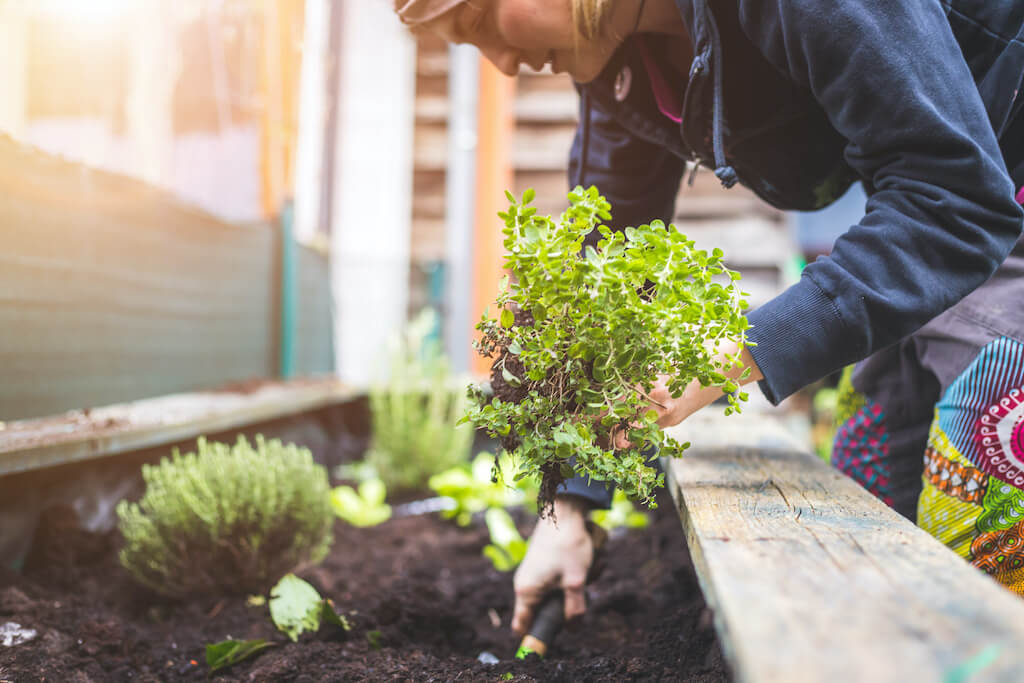The therapeutic power of nature is well-established, with numerous studies highlighting the benefits of spending time outdoors. But did you know that cultivating your garden could improve mental health?
For those who take joy in tending to their gardens, there’s an added layer of healing that comes from gardening and the plants they grow. Many plants possess properties that, when consumed in teas or tinctures, can relieve anxiety, depression, and other mental health concerns.
But this isn’t just about growing any plant. It’s about understanding which plants most profoundly impact our well-being.
Delve deeper, and you’ll find a world of botanical wonders waiting to be explored – all in the comfort of your backyard.
The Mind-Garden Connection
We often envision vibrant flowers and lush greenery when we think of gardening, but it’s much more than a visual treat. Planting, nurturing, and watching a plant grow is deeply therapeutic. As you dig into the soil, you’re planting seeds and sowing the foundation for a more peaceful mind. The rhythmic motions, the texture of the earth, and the anticipation of seeing a plant flourish mirror the journey of personal growth.
Every gardener knows that plants sometimes face challenges – pests, diseases, unfavorable weather – but they also understand that growth continues with care and patience. Similarly, we face challenges in life, but with the right nurture and care, we too can flourish.
The Power of Herbal Teas in Calming the Mind
Brewing herbal tea isn’t just about sipping on a warm beverage. It’s an age-old remedy that harnesses the medicinal properties of plants. Many herbs, when steeped, release compounds that have soothing effects on the mind. Lavender, for instance, is well-known for its calming properties. Drinking lavender tea can help reduce anxiety and promote better sleep. Another popular choice is lemon balm tea, which has a delightful citrusy aroma and is potent in alleviating stress and insomnia symptoms. Sipping on these natural concoctions brings a sense of tranquility, allowing one to drift into a peaceful state of mind. As we’ve always said, gardening provides stress relief, and what better way to enhance that relief than by consuming what you grow?
Beyond Teas: The World of Tinctures
While teas are delightful, tinctures offer a concentrated form of the therapeutic properties of plants. Made by soaking herbs in alcohol or vinegar for several weeks, tinctures are potent remedies that can be taken in small doses. For example, a tincture made from St. John’s Wort, a vibrant yellow flower, is effective against mild to moderate depression. Valerian root, often dubbed “nature’s Valium,” can be turned into a tincture to address insomnia and anxiety. Its earthy taste might not be everyone’s cup of tea, but its efficacy in promoting relaxation is undeniable.
The Wonders of Kava
Kava, a plant native to the South Pacific, has long been hailed for its anxiety-reducing properties. Consumed traditionally as a drink made from its roots, kava offers a natural way to calm the nerves without the side effects of pharmaceutical drugs. The active compounds in kava, known as kavalactones, interact uniquely with the brain. They modulate the neurotransmitters, leading to feelings of relaxation, improved mood, and even sociability. While not a stimulant, kava can provide clarity of mind and even mild euphoria in some individuals.
For the enthusiastic gardener, cultivating this wondrous plant might be appealing. Experienced gardeners can try to grow kava, but most find it easier to purchase a kava supplement. However, it could be worth a shot if you’ve got a green thumb, as this plant is highly beneficial. But it’s essential to remember that kava requires specific growing conditions, resembling its tropical homeland. If successfully grown, the rewards are immense – not just in the form of the plant but the mental tranquility it promises.
Plants That Double as Decor
Who said functional plants couldn’t be decorative? Take the Passionflower, for instance. With its intricate purple flowers, it’s a visual delight. But beyond its beauty, it’s a powerful remedy for anxiety and sleep disorders. Another example is the California poppy. It’s brilliant orange blooms can brighten up any space, and it’s known for its soothing properties, especially beneficial for those with insomnia.
Simple Preparations for Maximum Benefits
Once you’ve cultivated these therapeutic plants, knowing how to harness their benefits is essential. While teas and tinctures are popular, other preparations include infusions, decoctions, and poultices. For instance, here’s how to prepare chamomile tea: Start by picking fresh chamomile flowers from your garden. Rinse them and then steep in boiling water for about 5 minutes. Strain and enjoy. The gentle floral notes, accompanied by its calming effects, make it the perfect bedtime beverage.
Gardening is more than a hobby; it’s a journey into the world of natural healing. As we nurture our plants, we, in turn, nurture our minds. So, the next time you’re out in your garden, remember that the plants you tend could be the key to unlocking a more peaceful, centered you.

